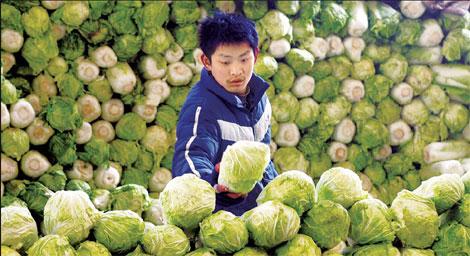
A man arranges cabbages at a market in Beijing. Surges in the price of solanaceous vegetables, including tomatoes, eggplants, chilies and bell peppers, have been more conspicuous in the first 10 days of November than those in leaf vegetables. [Bloomberg]
Data adds to inflation woes as foodstuffs lead growth
BEIJING - China's average wholesale prices for 18 types of vegetable in 36 cities surged by 62.4 percent year-on-year in the first 10 days of November, but are likely to drop back to normal levels by spring, analysts said.
The Ministry of Commerce said average wholesale vegetable prices in 36 cities reached 3.9 yuan (59 cents) per kilogram, more than 60 percent higher than the same period last year.
 Free trade deal lifts businesse
Free trade deal lifts businesseHowever, it said that in the first 10 days, price hikes of food products were not overdone, citing statistics in 50 cities, with the price of cucumbers showing the highest rise of 5.6 percent.
According to the Ministry of Commerce, the wholesale price of garlic shot up by 95.8 percent and that of ginger jumped 89.5 percent, compared with the same period last year.
In the meantime, increases in the price of solanaceous vegetables - including tomatoes, eggplants, chilies and bell peppers - were more conspicuous than those in leaf vegetables.
Seasonal increases, which were seen no earlier than October in previous years, took place in June, four months earlier than anticipated said the ministry.
"So far this year, the domestic food market has maintained a balance between supply and demand," said Wang Bingnan, director of the department of market operation regulation under the Ministry of Commerce.
A cluster of factors, including natural disasters, the increasing cost of vegetable cultivation, and speculation, caused the price hikes, he said.
Hu Bingchuan, assistant researcher at the Rural Development Institute of the Chinese Academy of Social Sciences, echoed Wang's opinion, adding that rising transportation costs may have pushed vegetable prices even higher.
Vagaries in the weather, including heavy rain and floods, have put a strain on domestic production, both in terms of quantity and quality, the ministry said.
Meanwhile, surges were also seen in the costs of labor, diesel and related factors in the transportation process.
"In the cases of garlic and ginger, the possibility of speculation cannot be ruled out," Hu added.
Despite the dramatic surges, the market has seen "slight declines" in vegetable prices during the past few days, said Liu Tong, head of the statistics office of Xinfadi market, the largest wholesale market for agricultural commodities in Beijing.
"For example, the wholesale price of garlic has declined 10 percent compared with last month," he said.
The approach of the New Year, when seasonal hikes usually peak will bring no relief, "prices are not expected to drop back to the normal level until the next spring", he added.





